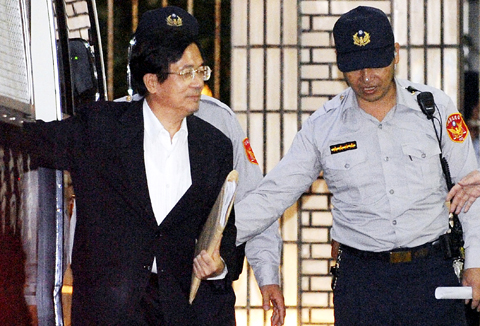The Taiwan High Court yesterday held a second detention hearing on arguments from prosecutors and former president Chen Shui-bian*s (蠊漵禶) lawyers to determine whether Chen should remain in detention. The hearing was continuing at press time.
After the High Court*s decision on Sept. 24 to keep the former president behind bars for another three months, until Dec. 23, Chen and his attorneys filed an appeal to the Supreme Court.
Presiding Judge Teng Chen-chiu (崠藙牊) explained the appeals court*s decision to extend Chen*s detention by saying he was suspected of committing serious crimes and, as a former president, he has more 〝channels to flee the country than an ordinary citizen.

PHOTO: REUTERS
The judges also expressed concern about the large amount of money and other assets the former first family possesses overseas.
After reviewing the High Court decision, the Supreme Court sent the case back to the appeals court for a new hearing.
The Supreme Court said the High Court*s reasons for keeping Chen in detention did not adequately explain why this was necessary, and questioned evidence supporting the High Court*s notion that Chen and his family hid huge amount of undisclosed cash and other assets overseas.
The Supreme Court also called into question the High Court*s reasoning that Chen has more 〝channels to flee the country because he is a former president. The Supreme Court asked the lower court to reconsider whether it was necessary to keep Chen detained, since as a former president, he is under surveillance by eight to 12 bodyguards from the National Security Bureau.
During the second detention hearing held at the High Court yesterday, Chen said little, while his newly rehired lawyers made lengthy arguments on his behalf.
Hung Kwei-san (?窀鯬) said the district court*s ruling on Sept. 11 had blatant structural mistakes and was not based on facts or evidence. Hung likened what he called a ※messy ruling§ to ※accounting records of a traditional grocery shop.§
Cheng Wen-lung (濷湞蛅) and Shih Yi-lin (鉥錥釸) argued that the district court should not have found Chen guilty for what his wife Wu Shu-jen (趠甃藟) was accused of doing.
Shih listed several reasons not to keep Chen detained, including the lack of evidence proving the former first family*s offshore assets were obtained illegally. He also argued that keeping a defendant in detention because the defendant has been accused of serious crimes violates the presumption of innocence.
Cheng said that after District Court Judge Chou Chan-chun (騍嚙臝) ruled to release Chen in December last year, Chen did not escape, showing that he has no intention of fleeing if he is released.
Prosecutors argued that even though Chen has security guards to protect him 24 hours a day, the guards are not legally bound to inform judicial authorities about Chen*s whereabouts. They also said that because Chen has been convicted of serious crimes, his incentive to flee the country has increased.
Democratic Progressive Party (DPP) Taipei branch director Huang Ching-lin (?杬釱), secretary of Chen*s office Chiang Chih-ming (阭礞棬) and other Chen supporters sat in on the trial.

A Chinese aircraft carrier group entered Japan’s economic waters over the weekend, before exiting to conduct drills involving fighter jets, the Japanese Ministry of Defense said yesterday. The Liaoning aircraft carrier, two missile destroyers and one fast combat supply ship sailed about 300km southwest of Japan’s easternmost island of Minamitori on Saturday, a ministry statement said. It was the first time a Chinese aircraft carrier had entered that part of Japan’s exclusive economic zone (EEZ), a ministry spokesman said. “We think the Chinese military is trying to improve its operational capability and ability to conduct operations in distant areas,” the spokesman said. China’s growing

Taiwan yesterday denied Chinese allegations that its military was behind a cyberattack on a technology company in Guangzhou, after city authorities issued warrants for 20 suspects. The Guangzhou Municipal Public Security Bureau earlier yesterday issued warrants for 20 people it identified as members of the Information, Communications and Electronic Force Command (ICEFCOM). The bureau alleged they were behind a May 20 cyberattack targeting the backend system of a self-service facility at the company. “ICEFCOM, under Taiwan’s ruling Democratic Progressive Party, directed the illegal attack,” the warrant says. The bureau placed a bounty of 10,000 yuan (US$1,392) on each of the 20 people named in

Nine retired generals from Taiwan, Japan and the US have been invited to participate in a tabletop exercise hosted by the Taipei School of Economics and Political Science Foundation tomorrow and Wednesday that simulates a potential Chinese invasion of Taiwan in 2030, the foundation said yesterday. The five retired Taiwanese generals would include retired admiral Lee Hsi-min (李喜明), joined by retired US Navy admiral Michael Mullen and former chief of staff of the Japan Self-Defense Forces general Shigeru Iwasaki, it said. The simulation aims to offer strategic insights into regional security and peace in the Taiwan Strait, it added. Foundation chair Huang Huang-hsiung

PUBLIC WARNING: The two students had been tricked into going to Hong Kong for a ‘high-paying’ job, which sent them to a scam center in Cambodia Police warned the public not to trust job advertisements touting high pay abroad following the return of two college students over the weekend who had been trafficked and forced to work at a cyberscam center in Cambodia. The two victims, surnamed Lee (李), 18, and Lin (林), 19, were interviewed by police after landing in Taiwan on Saturday. Taichung’s Chingshui Police Precinct said in a statement yesterday that the two students are good friends, and Lin had suspended her studies after seeing the ad promising good pay to work in Hong Kong. Lee’s grandfather on Thursday reported to police that Lee had sent